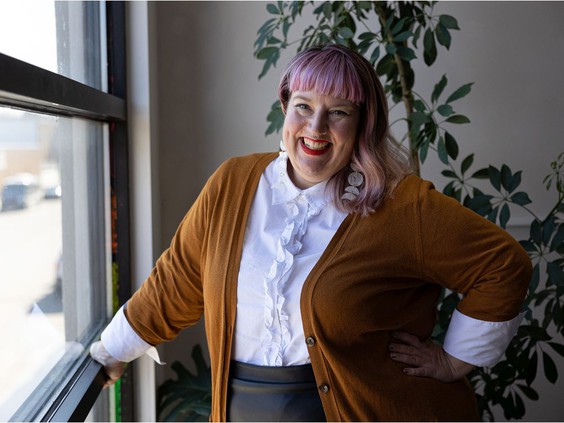
Strong, fierce, independent — Heather Hale is working tirelessly for Saskatoon Sexual Health
Hale (BA'03) ensures staff have the tools and resources they need to do their jobs and amplifies voices that aren't always heard.
By Thia James | Saskatoon StarPhoenixFor Heather Hale, who grew up in small-town Saskatchewan, serving the community has always been a part of life.
Hale was raised in Sceptre and attended the University of Saskatchewan, where she earned an undergraduate degree in political studies, and then she attended the University of Victoria to earn a master’s degree in community development.
From there, Hale moved to Ottawa to work for the Cooperative Development Foundation of Canada, where she was a project manager on co-operative development projects in Rwanda and Malawi helping support the lives of farmers. She travelled frequently to the two countries.
Hale returned to Saskatchewan in 2017 to be closer to family and for a career change — she joined Saskatoon Sexual Health as the executive director. It was a good fit for her because it was community based and Hale had a keen interest in sexual and reproductive justice.
She recalls attending a book club meeting in Saskatchewan shortly after moving back and hearing a discussion about gender equality and reproductive rights. Someone made a comment that things are “OK” these days, and Hale remembers feeling things were not OK and there was a lot still to do.
“That was kind of the start,” she recalls now in an interview with The Saskatoon StarPhoenix. “As you continue on, (you) kind of get more involved, more informed and be able to think about some of the issues in a more comprehensive or multi-faceted way.”
Jason Mercredi (BEd'09), the executive director of Prairie Harm Reduction, frequently works with Saskatoon Sexual Health. He says Hale is a big-picture thinker and remembers a time when she approached PHR about having Saskatoon Sexual Health run a Hepatitis C clinic out of PHR’s building. He agreed, but didn’t how they’d get the funding. Hale secured it from a private funder.
“It just shows she’s very creative, but she’s also very resourceful,” Mercredi says.
This year, PHR, Saskatoon Sexual Health and OUTSaskatoon partnered for this year’s AIDS Walk, which raised nearly $104,000. Mercredi says a big factor in that success is Hale’s leadership.
Krystal Nieckar, executive director of OUTSaskatoon, works out of the same building as Saskatoon Sexual Health and has an office near Hale’s. That proximity has offered Nieckar, new to her executive director position, an opportunity to tap Hale’s shoulder for support as she acclimatizes to her new role. She describes Hale as a generous leader who steps up for people when it matters.
“She’s strong and she’s fierce and she’s independent and she doesn’t take any s — t,” Nieckar says.
‘THERE’S LOTS TO WORK ON’
What is now Saskatoon Sexual Health was founded in 1971, and has undergone significant transformations in last 50 years, including name changes and an expansion of services. It has moved from primarily family planning and providing contraceptives to also offer testing for sexually transmitted infections and HIV, cervical cancer screening, medical abortion and pre-exposure prophylaxis (PrEP) for HIV. The organization also provides information about human rights, human sexuality, relationships and reproductive health.
“We know that young people are hungry for that information and that they do better when they have that information they need to make decisions about their bodies and their health and then develop those skills necessary to nurture and foster healthy relationships,” Hale says.
Saskatoon Sexual Health is also filling a major gap in terms of contact tracing and treating sexually transmitted and blood-borne infections in Saskatoon, Mercredi says.
“They’re not really well-funded for that, but they really make it work and their clinic is basically packed from the time they open ’til the time they close and they’re dealing with an issue that — especially during the pandemic — the health authority doesn’t necessarily have the resources to deal with or they don’t have the staff allocated to deal with, so they’re able to really respond to the needs of the community,” he says.
Hale and her team “work tirelessly to make sure the needs of the community — in particular the needs of the queer community — are met, that people feel valued when they come into our spaces, that they feel that their health is important, they feel that their pronouns will be respected, their gender will be respected,” Nieckar says.
Read the full article at https://thestarphoenix.com.

